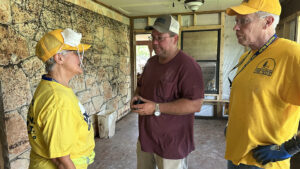
LAKE FOREST, Calif. (BP)–Joana crawled toward me on her skeletal elbows and knees, each movement a painful reminder of the fact that she was dying.
When I met her, this emaciated woman was homeless, living under a tree. She had unrelenting diarrhea, little food, no earthly possessions, and only an elderly auntie who had taken pity on her to care for her needs.
Still, she roused herself to offer me, an American visitor to her part of Mozambique, a traditional greeting.
The African pastors who brought me to visit her told me that she had been evicted from her village when it became known that she had AIDS. Now, in this second village, her tiny stick house had mysteriously burned after her status became known. A short time later, Joana died — rejected, abandoned, persecuted and destitute.
We may think this doesn’t happen in the United States. “People who are HIV-positive are treated better than that here,” we say. But I’m not so sure.
I live in affluent Orange County, Calif., yet a disabled man in my area who was HIV positive was not allowed to enter his brother’s home.
He and his wife could live in the backyard, but he couldn’t come inside. To bathe him, his wife had to attach a nozzle to a hose and shoot him with a hard spray of water that would hopefully dislodge dirt and grime. The family dog was treated better than this man; at least it could go in the house.
Like Joana in Mozambique, this man may also die rejected, abandoned, persecuted and destitute.
As a follower of Christ, I am seriously disturbed by both stories.
Horrific and startling images confront each of us daily through newspapers, television and eyewitness accounts of those suffering from AIDS. You can do what I did for years — choose to ignore it all because it was too painful — or you can become disturbed — seriously, dangerously disturbed — so disturbed that you are compelled to do something.
Christians are just as guilty as non-Christians of wanting to look the other way when it comes to the problems confronting our world, the topics that make us uncomfortable. But we need to be seriously disturbed about homelessness, child prostitution, rape, poverty, injustice and HIV/AIDS.
Twenty-five years into the AIDS pandemic, being HIV-positive still carries stigma and shame. But God cares for the sick and so must we.
It’s not a sin to be sick. The Bible tells us Jesus was repeatedly “filled with compassion” as He encountered broken bodies and broken minds. While polite society vigorously avoided contact with those they considered diseased outcasts, Jesus responded in a radical way: He cared, He touched, He healed.
I had no medication that could cure Joana, nothing to alleviate her pain, nothing that would restore her to health. But I offered the one thing that all of us can offer: I offered my presence. I put my arms gently around her, prayed for relief from her suffering and whispered, “I love you.”
This is a start, but much more is needed. Today, I challenge the worldwide church to take on the global giants of spiritual darkness, lack of servant leaders, poverty, disease and ignorance. It’s past time for those who claim to be Christ’s followers to join the struggle against the devastation that the HIV virus brings.
How many more like Joana have to die before you become seriously disturbed?
–30–
Kay Warren, wife of Rick Warren, founding pastor of Saddleback Church and author of “The Purpose Driven Life,” is executive director of Saddleback’s HIV/AIDS initiative. An accomplished writer, she has traveled globally to speak and learn about the AIDS pandemic. This commentary first appeared on CNN.com June 7. Used by permission of Kay Warren.















